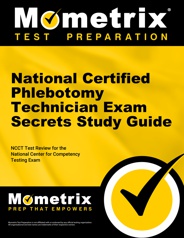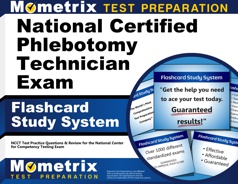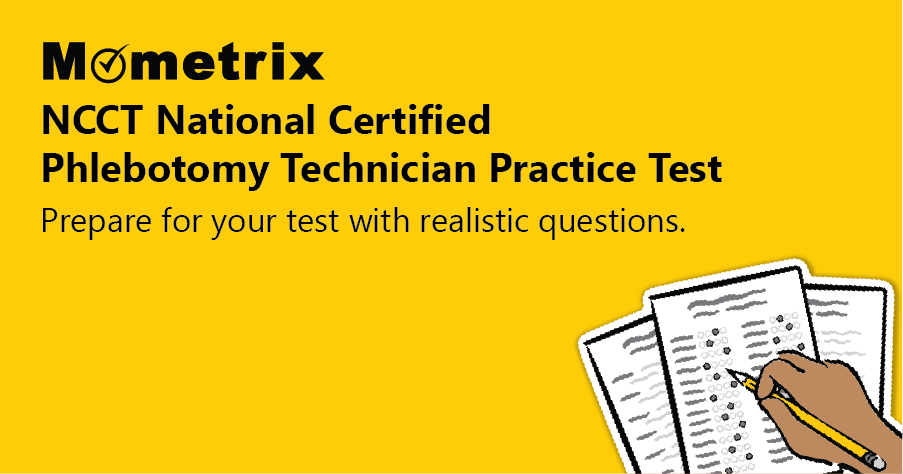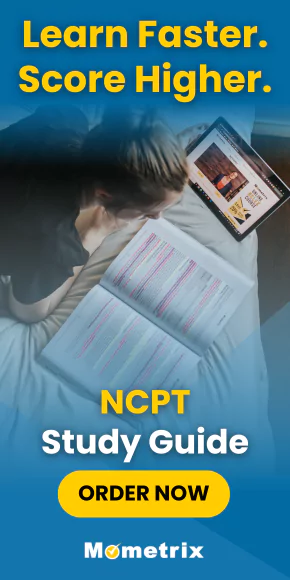Obtaining a phlebotomy career requires a considerable amount of specialized training. Because of this, aspiring phlebotomists all across the country must first prove they have attained all the necessary competencies before receiving their official licenses.
On this page, you’ll find out what the NCPT Test is all about, what you can expect from the test content, how you can register to take the test, and how the test is scored so you can achieve your phlebotomist license.
What is the NCPT Certification Test?
The National Certified Phlebotomy Technician (NCPT) Certification test is a test administered by the National Center for Competency Testing (NCCT). Upon passing this test, a professional phlebotomist will receive a license proving their competency in the field.
According to the NCCT, test takers who pass the NCPT will be counted among qualified phlebotomy technicians. As a licensed phlebotomy technician, you will be qualified to perform tasks such as venipuncture, micro-collection, and specimen processing and handling. You will also be expected to uphold professional standards for patient safety and confidentiality.
The National Phlebotomy Association (NPA) lists that those who should consider getting a phlebotomy license and certification include Certified Nursing Assistants, Medical Assistants, Registered Nurses, Licensed Practical Nurses, and Emergency Medical Technicians.
Eligibility
There are three routes of eligibility for people looking to take the exam. These are:
- Current students of a phlebotomy technician program or a graduate thereof within the past five years
- A person with one year of verifiable full-time experience as a Phlebotomy Technician practitioner within the past five years
- Those who have completed training or a year of experience in the military
Each eligibility route asks you to submit different requirements for your application. For those with experience, you will be asked to fill in a Phlebotomy Technician Certification Qualification by Experience and Critical Skill form. Once you have submitted your requirements, you may proceed with taking the test on your scheduled date.
Check Out Mometrix's National Certified Phlebotomy Technician Printed Study Guide
Get practice questions, video tutorials, and detailed study lessons
Get Your Study Guide
NCPT Exam Outline
The NCPT exam contains a total of 125 questions, 25 of which are unscored, and you will be given a time limit of 3 hours. The unscored questions are used by the test administrators to validate questions for use on future versions of the exam.
The exam is split into five content categories:
1. Infection Control and Safety (15 scored questions)
The questions in this category are designed to test your knowledge and skills in the following areas:
- Preventing infection and transmission
- Maintaining patient safety during collection
- Cleaning and disinfecting facilities and equipment
- Using PPE
- Activating safety mechanisms on phlebotomy equipment
- Following protocol for blood and bodily fluid exposure
- Disposing of phlebotomy equipment following OSHA standards
2. Preparing for Specimen Collection (25 scored questions)
The questions in this category are designed to test your knowledge and skills in the following areas:
- Verifying equipment quality
- Differentiating between additives and anticoagulants added to collection tubes
- Selecting appropriate/proper equipment for various types of patients, tests, and scenarios
- Adhering to patient identification standards
- Reviewing orders for patient specimen collection
- Evaluating pretest conditions for patients
- Educating patients about specimen collection
- Applying and releasing a tourniquet
- Selecting appropriate sites for blood collection
- Preparing sites for blood collection
- Documenting patient and collection information
3. Specimen Collection (30 scored questions)
The questions in this category are designed to test your knowledge and skills in the following areas:
- Prioritizing patient collections
- Taking precautions for patients with medical conditions
- Adapting to patients with special considerations
- Using CLSI recommended order of draw
- Anchoring the vein
- Performing various collections
- Instructing the patient in the proper collection and preservation of non-blood specimens
- Collecting non-blood specimens per requirements
- Labeling specimens
- Maintaining specimen integrity
- Delivering specimens to the correct department
- Performing quality assurance in the collection of blood specimens
4. Collection Complications and Troubleshooting (15 scored questions)
The questions in this category are designed to test your knowledge and skills in the following areas:
- Following protocols for patients on anticoagulant therapy
- Performing specimen collection of difficult-to-draw patients
- Responding to patient adverse reactions
- Taking appropriate action when blood return is not established
- Preventing interference in clinical analysis
- Preventing pre-analytical sources of error regarding specimen integrity
5. Law and Ethics (15 scored questions)
The questions in this category are designed to test your knowledge and skills in the following areas:
- Recognizing legal responsibilities of a phlebotomy technician
- Adhering to the AHA Patient’s Bill of Rights
- Obtaining consent to perform specimen collection
- Preventing occurrences that could result in legal action
- Complying with laws related to medical records and confidentiality
- Complying with laws and regulations governing specimen collection
- Complying with chain of custody collection requirements
- Complying with laws governing reportable incidents
Essential Knowledge
In a broader sense, there are several integrated concepts that you will need to apply a working understanding of:
|
|
How to Pass
Think you aren’t a good test-taker? Maybe on a study-time crunch? Or just don’t know how to begin studying? Mometrix has designed a new Study Secrets course to help every student, no matter what study scenario you are in. Here’s what you’ll find in the Study Secrets Course:
- Techniques to Conquer Procrastination
- Steps to building a Study Plan custom to your learning style
- 7 Effective Note-Taking Methods
- Test-Taking Tips
- Memory Techniques and Mnemonics
- And much more!
Everyone learns differently, so we’ve tailored our Study Secrets Course to ensure every learner has what they need to prepare for their upcoming exam or semester. Click below to check it out!
Check Out Mometrix's National Certified Phlebotomy Technician Flashcards
Get complex subjects broken down into easily understandable concepts
Get Your Flashcards
FAQs
Q
How many questions are on the NCPT exam?
A
There are 125 questions on the exam, 25 of which are unscored.
Q
How long is the NCPT exam?
A
The time limit for the exam is 3 hours.
Q
What is the minimum passing score for the NCPT exam?
A
You’ll need to get a scaled score of at least 575 to pass the exam.
Q
How long will it take to receive NCPT test scores?
A
You can generally expect to receive their exams two days after finishing the test.
Q
How much does the NCPT exam cost?
A
The testing fee is $119.
Mometrix Test Preparation is not affiliated with or endorsed by any official testing organization. All organizational and test names are trademarks of their respective owners.




